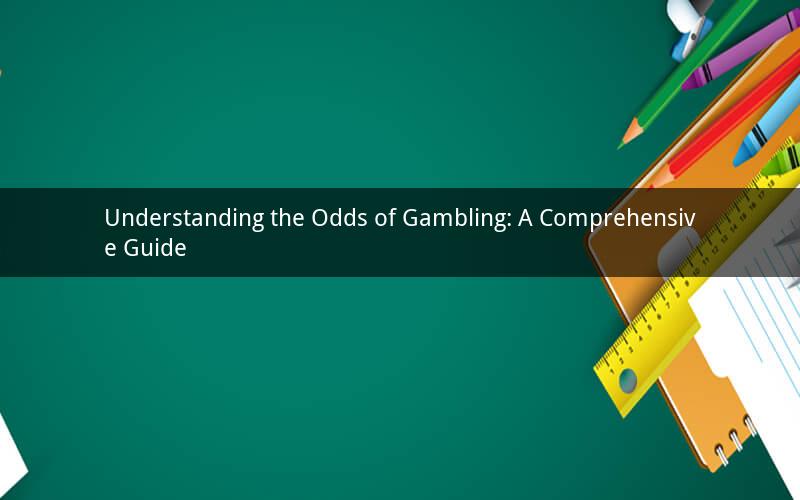
Gambling has been a popular form of entertainment for centuries, captivating people with its thrilling and potentially lucrative nature. However, one crucial aspect that often goes unnoticed is how the odds of gambling work. This article delves into the intricate workings of odds in gambling, providing an in-depth understanding of how they affect the likelihood of winning and losing.
1. What are odds in gambling?
Odds in gambling refer to the likelihood of an event occurring. They are typically expressed as a ratio or a fraction, such as 1:2, 3:1, or 1/3. The higher the odds, the less likely the event is to happen, and vice versa.
2. How do odds work in gambling?
Odds work by calculating the probability of an event occurring. In gambling, this is usually determined by the number of favorable outcomes divided by the number of possible outcomes. For instance, if you are betting on a coin toss, there are two possible outcomes: heads or tails. Since there is an equal chance of either outcome, the odds are 1:1.
3. Types of odds in gambling
There are three main types of odds in gambling: fractional odds, decimal odds, and American odds.
a. Fractional odds: These are the most common odds format in the United Kingdom. They are expressed as a fraction, with the numerator representing the potential profit and the denominator representing the stake. For example, if you bet on a horse with fractional odds of 5/1, you would win $5 for every $1 you bet, plus your original stake.
b. Decimal odds: These odds are widely used in Europe and are calculated by adding 1 to the fractional odds. For example, a horse with fractional odds of 5/1 would have decimal odds of 6.0. If you bet $10 on this horse and it wins, you would receive a total payout of $60 ($50 profit plus your original stake).
c. American odds: These odds are used primarily in the United States and can be positive or negative. Positive odds indicate how much you would win on a $100 bet, while negative odds represent how much you need to bet to win $100. For example, a horse with positive American odds of +300 means you would win $300 on a $100 bet, while negative odds of -200 mean you need to bet $200 to win $100.
4. Factors affecting odds in gambling
Several factors can influence the odds of a gambling event:
a. Skill: In games that require skill, such as poker or blackjack, the odds can be affected by the players' abilities. Skilled players can increase their chances of winning by making informed decisions and exploiting their opponents' weaknesses.
b. Luck: Some gambling events, such as slot machines or roulette, rely heavily on luck. The odds in these games are typically predetermined by the casino or game developer, making them more challenging to predict.
c. House edge: Casinos and gambling operators have a built-in advantage called the house edge, which is the average percentage of money they expect to win over time. This edge is calculated into the odds of the games and affects the player's chances of winning.
5. Strategies for beating the odds
While it is impossible to guarantee a win in gambling, there are strategies that can help improve your chances:
a. Educate yourself: Familiarize yourself with the rules, strategies, and odds of the games you play. This knowledge can help you make more informed decisions and avoid common pitfalls.
b. Manage your bankroll: Set a budget for your gambling activities and stick to it. Avoid chasing losses and never borrow money to gamble.
c. Take advantage of bonuses and promotions: Many casinos and online gambling sites offer bonuses and promotions to attract players. Utilize these offers to maximize your chances of winning.
d. Play games with lower house edges: Some games, such as blackjack or video poker, have lower house edges compared to others. Focus on these games to increase your chances of winning.
In conclusion, understanding how the odds of gambling work is crucial for anyone looking to participate in this form of entertainment. By familiarizing yourself with the different types of odds, factors affecting them, and strategies for improving your chances, you can make more informed decisions and enjoy a more rewarding gambling experience.
Questions and Answers:
1. Q: Can the odds of a gambling event change over time?
A: Yes, the odds of a gambling event can change due to various factors, such as player skill, changes in the game's rules, or the house edge.
2. Q: Are there any games with a higher house edge than others?
A: Yes, games like slots, keno, and roulette typically have higher house edges compared to games like blackjack or poker.
3. Q: Can I use mathematical formulas to predict the odds of a gambling event?
A: While mathematical formulas can help you calculate the odds of a gambling event, they cannot guarantee a win. The outcome of a gambling event is often influenced by luck and other unpredictable factors.
4. Q: Are there any legal implications to understanding the odds of gambling?
A: Understanding the odds of gambling is not illegal. However, it is essential to be aware of the legal age and regulations for gambling in your jurisdiction.
5. Q: Can I increase my chances of winning by betting on multiple outcomes in a gambling event?
A: Betting on multiple outcomes can increase your chances of winning a smaller amount, but it does not improve your overall chances of winning the event. It is crucial to evaluate each bet carefully and consider the odds of each outcome.